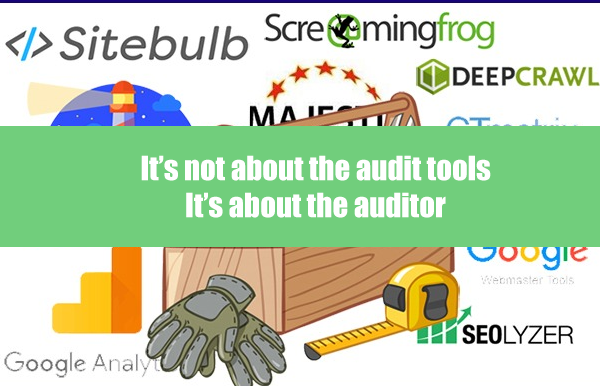I’ve been in this “thing of ours” for 21 years now.
And for about 12-13 years of that, I’ve been doing audits (technical and forensic). A lot of them, too.
From mom-and-pop shops to Fortune 500s – I’ve been there and done that.
Over that time, my processes have evolved. Interestingly, SEO audits really weren’t nearly as commonly talked about in the past as they are today.
Because, you know, everyone just went from “throw a few links at it” to “social signals” and every other new shiny toy that came along.
But lately, folks seem to be getting it.
So, let’s talk about the mindset required to effectively do a technical SEO audit, shall we?
Cart & Horse Syndrome
This first thing to consider is that a lot of people seem to always focus on the tools and data and allow that to drive the audit that they’re conducting. That’s more than just a little bit backward.

We want to get a sense of the needs and goals of the website long before we even worry about which tools and data-sets we’ll need to get the job done.
Nothing frustrates me more than seeing folks ask things like, “what’s the best tool for doing SEO audits?”
No… just… no.
As for actual tools/data, I have a list of my preferred ones over here.
Cookie Cutter
Another thing one should never do is “cookie-cutter SEO” and that includes audits.
The SEO audit can vary depending on the budget the client has and the goals of the program and site.
If you are doing a stand-alone audit, it would likely be more comprehensive than one done as part of an ongoing program, such as a quarterly review.

Understanding the needs and limitations of the site is also going to play into how you go about it.
A national ecommerce site is going to have a different approach than a local service business.
Furthermore, even in related markets and service types, the budgets, resources and more will differentiate the business in question.
Get it?
Even I have a framework for SEO audits, but it’s always adapted to the situation.
Getting Started: Understanding the Business
Now that we’re past that, establish the needs of the situation.
A lot of times people coming to you for an audit are looking for a second set of eyes from someone that’s keeping up with SEO – because they’re busy running their business.
Or, in the in-house situation, they are seeking answers to issues, strategy, budget development, and more.
Let’s consider: What are the goals of the audit? What’s the purpose?
- Is it a local-focused site?
- Is it a national brand?
- Is it an international brand?
- Is it for lead generation?
- Is it a branding situation such as a B2B service?
- Is it an ecommerce site selling products?
- Is it for risk assessment (ensuring no future penalties)?
You get the idea.
When talking to the client we seek to understand the situation and the needs. That’s step 1. The basics
To that end, the onboarding phase is paramount to the process. This can include:
- Asking the right questions.
- Getting past data from the SEO to web developer logs.
- Determining what the business model is.
- Getting primary contact (too many cooks).
So much of the technical audit process – and ultimately its success – comes down to the initial onboarding process. Never skate past it.
Why are they coming to you?
- Did they read a blog post?
- Do they have specific concerns?
- Did somebody advise them to?
- What are they looking to gain from the audit?
In short, what motivated them to seek out someone to conduct the audit.
This will certainly go a long way towards not only managing expectations, but ultimately delivering actionable reports that are of value.
Next, who are you writing for?
It could be any of the following:
- In-house team leader.
- Marketing director.
- Small/medium-sized business owner
- SEO agency.
- Web design firm.
Are they technically proficient?
Going back to the cookie-cutter notes, you should always know who is going to be reading it and implementing it. How you write and configure the audit is going to be based on this.
Depth of Audits
Another obvious thing we need to consider is the actual type of audit we’re conducting.
My approach breaks down into two types:
Limited Site Audit
The limited audit is for the budget conscious and consists of a top-down overview type report that will identify elements that we need to be looking at deeper. This is basically the 40,000-foot view.
We’re going through most of the core elements we’d have in the comprehensive audit on a more cursory level to see if more in-depth analysis needs to be done.
These are also good as a quarterly review when you’ve already conducted a comprehensive audit (below).
Comprehensive Site Audit
The comprehensive is a full-on deep-dive that goes through the entire list of elements that I use (we all have our own).
These are obviously far more expensive and often can be comprised of dozens of pages in reporting and even more in data sets.
These also will generally include a complete set of short, medium- and long-term activities for them to work on, based on priority.
What About Other Types of Audits?
Sure, there are other types such as:
- Forensic traffic recovery audits.
- Content audits.
- UX audits.
- And more.
But today, we’re just focused on technical SEO site audits.
We just want to have options. Only having one flavor of technical audit doesn’t really make sense to me. It’s not always the case where we need a full-on approach. Sometimes less is just fine as well.
Reporting & Deliverables
Next up, let’s get into what you should be sending back from the audit.
The obvious question always arises – how much is too much?
When organizing the data and recommendations, let’s consider:
- Making it functional.
- Who’s doing the implementation.
- Whether it’s a first time or quarterly review.
- If there’s more than one team using it.
Generally speaking, you want to include:
- Written, manageable, reports on the various elements you’re including.
- Accompanying data (keep it separate and annotate in the written sections).
- Spreadsheet of short-, medium- and long-term activities (as a work log).
- Meeting time – with your contact and implementation teams.
We also want to consider implementation.
- Are you and your team implementing the recommendations?
- Or is it on the client’s side, or in the case of in-house teams, the devs working for the company?

The Best Tools Is Between Your Ears
At the end of the day, it’s your abilities, as an auditor that the results will lean on.
I can’t count the number of times people ask, “What’s the best tool for an audit?”
And that’s my answer – the one between your ears.
If you are following all of the above, before you even boot up your tools, before you collect the data, the results of the audit are going to be a lot better.
As will the eventual effects of the actions taken as part of the SEO audit.
So to the original premise, the role of the technical SEO audit depends on a lot of different factors.
It’s up to you, the auditor, to establish the needs and the process and to deliver an effective audit that will ultimately benefit the site.
The Mindset
The mindset of an SEO auditor is one of flexibility and understanding.
- The flexibility to adapt your own approaches, systems and data sources to pull it off.
- An understanding of the situation that you’re operating in which ensures the end result is actually of value to the site/client.
Above all, resist the urge to plug-and-play. When you’ve finished an audit, throw it far from your mind before you start the next one.
Each situation is unique. As such, so should your audits be.
More Resources:
- What Is Forensic SEO?
- Your Ultimate SEO Audit Checklist [EBOOK]
- How to Perform an In-Depth Technical SEO Audit
Image Credits
In-Post Images: Provided by author, January 2020


